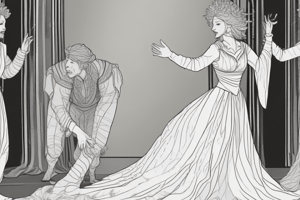Podcast
Questions and Answers
What is the semiotics of acting?
What is the semiotics of acting?
- The study of how actors use their physical expressivity
- The study of how actors interpret drama
- The study of the ways in which aspects of a performance come to operate for its audience as signs (correct)
- The study of how actors create characters
What is improvisation in acting?
What is improvisation in acting?
- A substantial element of classical forms of acting and is used to cover up any mistakes made by the actor (correct)
- A technique used to create a character
- A technique used to memorize lines
- A technique used to project emotions
What is the purpose of a resume for actors and actresses?
What is the purpose of a resume for actors and actresses?
- To list their previous projects and skills when applying for roles (correct)
- To provide a summary of their personal life
- To showcase their physical appearance
- To provide references
What is auditioning in acting?
What is auditioning in acting?
What is rehearsal in acting?
What is rehearsal in acting?
What is stage fright?
What is stage fright?
What is the effect of increased training and exposure to public speaking on humans?
What is the effect of increased training and exposure to public speaking on humans?
What is the purpose of improvisation in classical forms of acting?
What is the purpose of improvisation in classical forms of acting?
What is the purpose of a critical audience with evaluative spectators?
What is the purpose of a critical audience with evaluative spectators?
Flashcards
Actor Heart-Rate and Stress
Actor Heart-Rate and Stress
Performance anxiety causes physiological arousal, leading to a heightened heart rate in actors.
Performance vs. Rehearsal
Performance vs. Rehearsal
The pressure of performing for an audience, especially knowing it can impact their career, makes actors' hearts race more during shows compared to rehearsals.
Post-Performance Heart-Rate
Post-Performance Heart-Rate
Once the performance ends, the stress subsides, causing the actor's heart rate to decrease back to normal.
Applause and Heart-Rate
Applause and Heart-Rate
Signup and view all the flashcards
Heart-Rate and Stress Correlation
Heart-Rate and Stress Correlation
Signup and view all the flashcards
Pre-Performance Heart-Rate
Pre-Performance Heart-Rate
Signup and view all the flashcards
Factors Affecting Stress
Factors Affecting Stress
Signup and view all the flashcards
Heart-Rate and Speaking
Heart-Rate and Speaking
Signup and view all the flashcards
Post-Performance Heart-Rate Drop
Post-Performance Heart-Rate Drop
Signup and view all the flashcards
Study Notes
Acting involves storytelling through the enactment of a character in various mediums such as theatre, film, and television. Actors require a range of skills including imagination, emotional facility, physical expressivity, vocal projection, and the ability to interpret drama. Most professional actors undergo extensive training in specialist programs or colleges. Acting classes for young actors are also widespread. Increased training and exposure to public speaking allows humans to maintain calmer and more relaxed physiologically. Improvisation is a substantial element of classical forms of acting and is used to cover up any mistakes made by the actor. Acting in front of an audience can cause stage fright, which results in increased heart rate, blood pressure, and sweating. The semiotics of acting involves a study of the ways in which aspects of a performance come to operate for its audience as signs. Actors and actresses need to make a resume when applying for roles, which should list their previous projects and skills. Auditioning is the act of performing either a monologue or sides as sent by the casting director. Rehearsal is a process in which actors prepare and practice a performance. A critical audience with evaluative spectators is known to induce stress on actors during performance. Heart rates are generally always higher during a performance with an audience when compared to rehearsal, however, the stress can improve the performance, supporting the idea of "positive stress in challenging situations."Heart-Rate and Stress in Actors Title
- Heart-rate increases in actors due to performance anxiety and associated physiological arousal.
- Heart-rate rises more during shows compared to rehearsals due to increased pressure associated with the potential impact on an actor's career.
- After the show, there is a decrease in heart-rate due to the conclusion of the stress-inducing activity.
- During the applause after the performance, there is a rapid spike in heart-rate.
- The correlation between heart-rate and stress in actors is significant.
- Heart-rates rise right before the performance begins for those actors opening.
- Factors that can add to an actor's stress include length of monologues, experience level, and actions done on stage.
- Throughout the performance, heart-rate rises the most before an actor is speaking.
- Stress and heart-rate of the actor then drops significantly at the end of a monologue, big action scene, or performance.
- This phenomenon is not only observed in actors but also in public speaking and musicians.
- A 2017 study in an American University measured actors' stress by analyzing their heart-rate.
- Actors claim that having an audience has no change in their stress level.
Studying That Suits You
Use AI to generate personalized quizzes and flashcards to suit your learning preferences.




